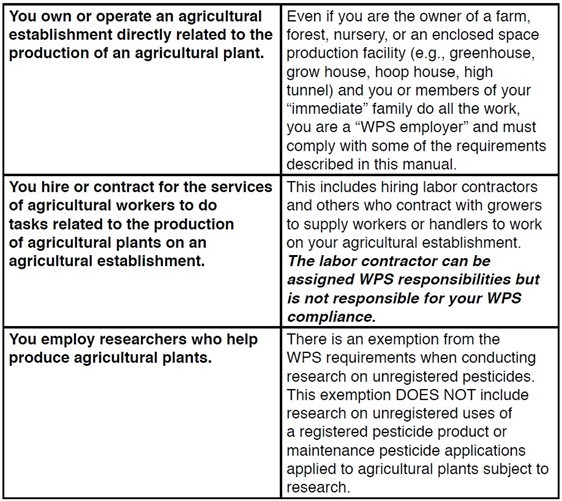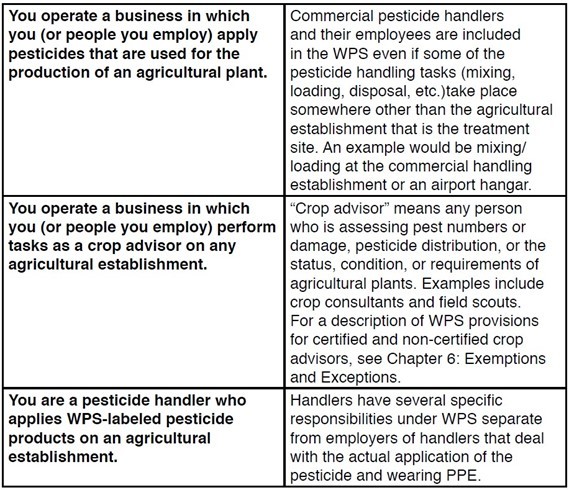Introduction to Worker Protection Standard
Katelyn Miller, Field Crops and Forage Specialist
Southwest New York Dairy, Livestock and Field Crops Program
The Worker Protection Standard (WPS) is a regulation originally issued by the U.S. Environmental Protection Agency (EPA) in 1992. It covers pesticides used in the production of agricultural plants on farms, forests, nurseries, and greenhouses. The WPS requires employers (agricultural and commercial pesticide handlers) to provide specific information and protections to workers, handlers, and other persons when WPS labeled pesticide products are used in the production of agricultural plants. It's intended to reduce the risk of injury and illness resulting from pesticide exposures on agricultural establishments.
Based on the WPS How to Comply Manual, the WPS applies to you if:


Knowing if you fall under WPS is important, but there are also some definitions that are crucial to understanding when it applies.
Agricultural Plants are plants grown and maintained for commercial or research purposes. Examples include food, feed, fiber plants, seedlings, tress, etcetera.
A worker is anyone who is employed for compensation (including self-employed) and performs tasks like harvesting, pruning, weeding, or watering in the production of agricultural plants.
A handler is anyone who is employed for compensation (including self-employed). They perform tasks such as mixing, loading, or applying pesticides; assisting in pesticide applications; cleaning, repairing, or adjusting spray equipment, or acting as a flagger. A person is not a handler if they only handle pesticide containers that have never been opened or have been emptied and cleaned according to instructions on the pesticide product labeling.
A crop advisor is any person who assesses pest numbers, damage, pesticide distribution, or the status or requirements of agricultural plants.
Other Persons include nonworkers, family members, customers, government officials, and any bystanders.
To determine if you fall under the Worker Protection Standard, or need more information on how to comply, check out the WPS How to Comply Manual at https://www.pesticideresources.org/migrated/wps/htc/htcmanual.pdf, or contact your local DEC office.
DEC Region 8 Regional Headquarters in Avon: 585-226-2466
DEC Region 9 Regional Headquarters in Buffalo: 716-851-7200
WPS How to Comply Manual (pdf; 2415KB)
Upcoming Events
Piglet Health 101
February 13, 2026 : Piglet Health 101 - Batavia, NY
Batavia, NY
This free workshop from the New York Pork Producers offers hands-on training in essential piglet care and processing practices, led by industry veterinarians from Passion for Pigs. No matter your experience level, this training offers takeaways for both new and experienced producers.
Boots in the Barn: Cornell Dairy Research Updates
January 13, 2026
January 20, 2026
January 27, 2026
February 3, 2026
February 10, 2026
February 17, 2026
February 24, 2026
Join us for some or all!
2026 No-Till & Cover Crop Conference
February 19, 2026 : 2026 No-Till & Cover Crop Conference
South Burlington, VT
Announcements
Cows, Crops & Critters Newsletter Sponsorship
TRYING TO REACH GROWERS AND AGRIBUSINESSES IN OUR SOUTHWEST REGION OF NEW YORK?Weekly Email Update: Shared with 625+ households who have signed up with our program.
Monthly Paper Mailer: To reach our stakeholders and farmers who lack internet access, we send out a monthly mailer where your company's logo and contact information would be featured with a mailing list of 330+ households.
If you sponsor our weekly and monthly publications you reach approximately 955 households.





